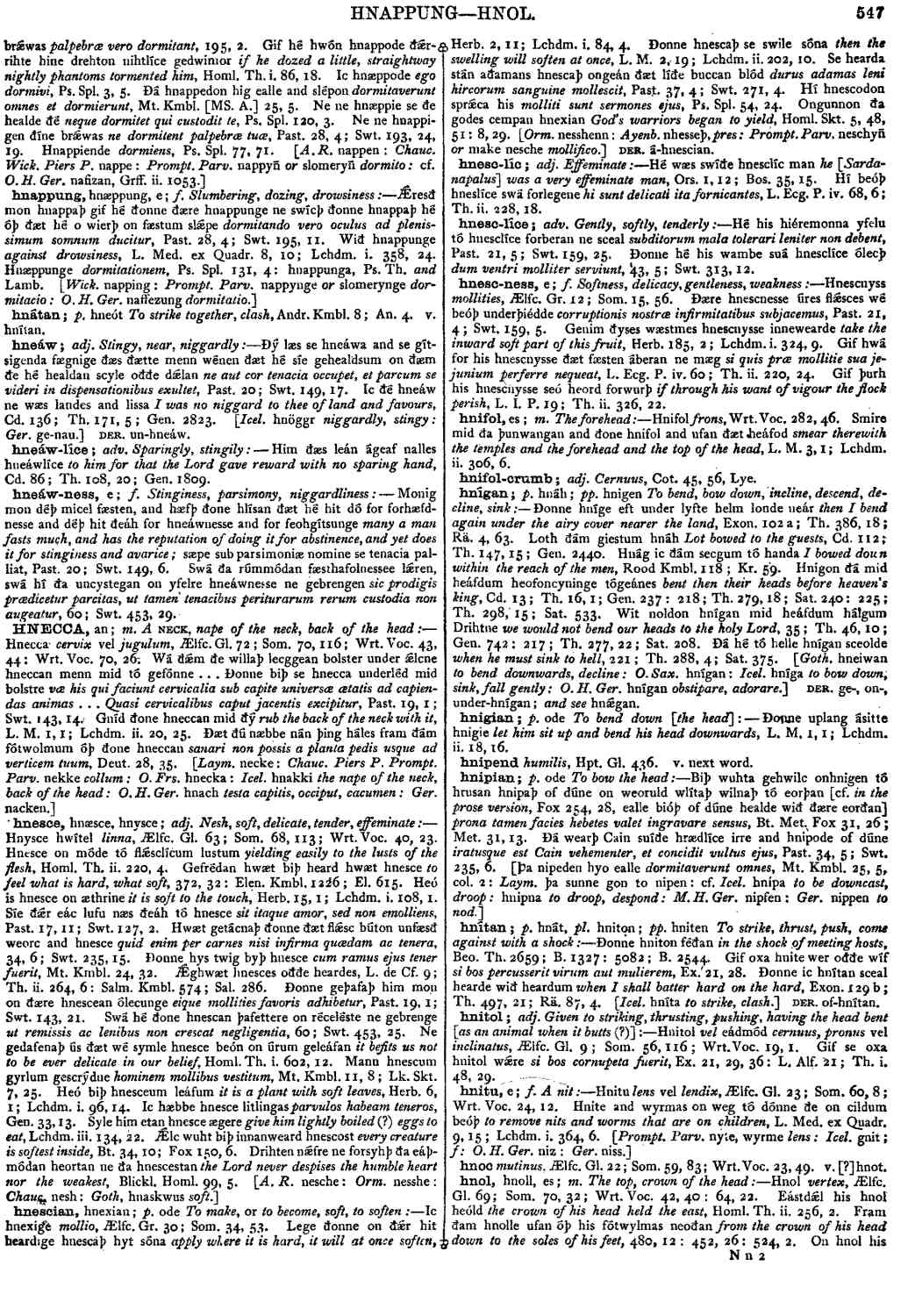hnesce
- adjective
-
Hnysce hwítel
linna,
- Ælfc. Gl. 63; Som. 68, 113; Wrt. Voc. 40, 23.
-
Hnesce on móde tó flǽsclícum lustum
yielding easily to the lusts of the flesh,
- Homl. Th. ii. 220, 4.
-
Gefrédan hwæt biþ heard hwæt hnesce
to feel what is hard, what soft,
- 372, 32: Elen. Kmbl. 1226; El. 615.
-
Heó is hnesce on æthrine
it is soft to the touch,
- Herb. 15, 1; Lchdm. i. 108, 1.
-
Síe ðǽr eác lufu næs ðeáh tó hnesce
sit itaque amor, sed non emolliens,
- Past. 17, 11; Swt. 127, 2.
-
Hwæt getácnaþ ðonne ðæt flǽsc búton unfæsð weorc and hnesce
quid enim per carnes nisi infirma quædam ac tenera,
- 34, 6; Swt. 235, 15.
-
Ðonne hys twig byþ hnesce
cum ramus ejus tener fuerit,
- Mt. Kmbl. 24, 32.
-
Ǽghwæt hnesces oððe heardes,
- L. de Cf. 9; Th. ii. 264, 6: Salm. Kmbl. 574; Sal. 286.
-
Ðonne geþafaþ him mon on ðære hnescean ólecunge
eique mollities favoris adhibetur,
- Past. 19, 1; Swt. 143, 21.
-
Swá hé ðone hnescan þafettere on réceléste ne gebrenge
ut remissis ac lenibus non crescat negligentia,
- 60; Swt. 453, 25.
-
Ne gedafenaþ ús ðæt wé symle hnesce beón on úrum geleáfan
it befits us not to be ever delicate in our belief,
- Homl. Th. i. 602, 12.
-
Mann hnescum gyrlum gescrýdne
hominem mollibus vestitum,
- Mt. Kmbl. ii. 8; Lk. Skt. 7, 25.
-
Heó biþ hnesceum leáfum
it is a plant with soft leaves,
- Herb. 6, 1; Lchdm. i. 96, 14.
-
Ic hæbbe hnesce litlingas
parvulos habeam teneros,
- Gen. 33, 13.
-
Syle him etan hnesce ægere
give him lightly boiled (?) eggs to eat,
- Lchdm. iii. 134, 22.
-
Ǽlc wuht biþ innanweard hnescost
every creature is softest inside,
- Bt. 34, 10; Fox 150, 6.
-
Drihten nǽfre ne forsyhþ ða eáþmódan heortan ne ða hnescestan
the Lord never despises the humble heart nor the weakest,
- Blickl. Homl. 99, 5.
Bosworth, Joseph. “hnesce.” In An Anglo-Saxon Dictionary Online, edited by Thomas Northcote Toller, Christ Sean, and Ondřej Tichy. Prague: Faculty of Arts, Charles University, 2014. https://bosworthtoller.com/19362.
Checked: 0